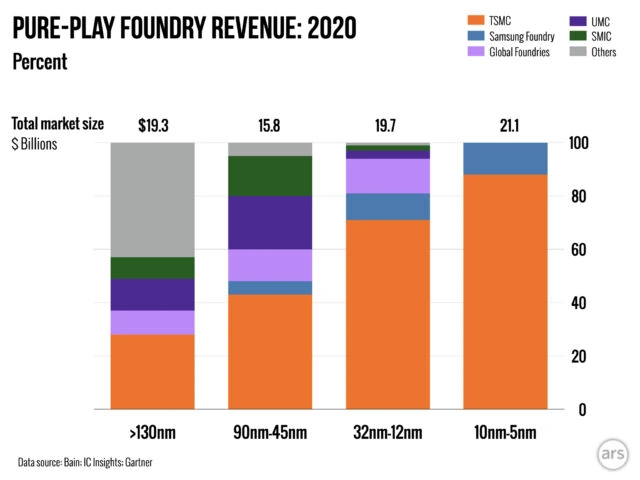
This is exactly what we've seen in the semiconductor foundry market. There are a ton of semiconductor foundries that produce chips for third parties -- but there are only a couple of players at the bleeding-edge of the semiconductor process technology race. GlobalFoundries abandoned the race a couple of years ago, which means clients who need the best process nodes can only turn to TSMC, and to a lesser extend Samsung. Perhaps this will change in the near-future if Intel's second attempt at offering foundry services is more successful, but at the moment TSMC is truly a dominant force in the foundry market.
When you look at the 5nm to 10nm nodes, TSMC has a marketshare of almost 90 percent. Outside the computer enthusiast community, not a lot of people know TSMC, but it's without a doubt one of the most important companies in the world as a lot of products as well as manufacturing industries rely on chips made by TSMC. A lot of countries have realized over the past couple of years that this makes them vulnerable to trade wars or other calamities -- which resulted in a push in both the US and Europe to bring back domestic chip manufacturing capacity because these days almost everything is concentrated in East-Asia.
ARS Technica has an interesting article that explains how TSMC became the lynchpin of the global economy, you can read it over here.
[TSMC] is getting more dominant with every new process technology node: while it only accounts for 40 to 65 percent of revenues in the 28-65 nm category, the nodes used for producing most car chips, it has almost 90 percent of the market of the most advanced nodes currently in production.
“Yes, the industry is incredibly dependent on TSMC, especially as you get to the bleeding edge, and it is quite risky,” says Peter Hanbury, a partner at Bain & Company in San Francisco. “Twenty years ago there were 20 foundries, and now the most cutting-edge stuff is sitting on a single campus in Taiwan.”
